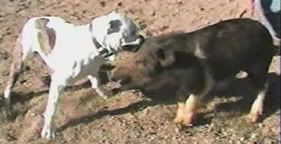Friday dogblogging: Mississippi renews ban on hog-dog fighting
 Last week Mississippi Gov. Haley Barbour signed into law a measure that renews the state's ban on hog-dog fighting, first passed in 2006. Also known as "hog catching," "hog baiting," or "hog-dog rodeo," the practice involves setting loose trained attack dogs -- usually pit bulls or American bulldogs -- on trapped feral pigs who often have their tusks removed to leave them defenseless. The law imposes a maximum fine of $1,000 and a six-month prison sentence.
Last week Mississippi Gov. Haley Barbour signed into law a measure that renews the state's ban on hog-dog fighting, first passed in 2006. Also known as "hog catching," "hog baiting," or "hog-dog rodeo," the practice involves setting loose trained attack dogs -- usually pit bulls or American bulldogs -- on trapped feral pigs who often have their tusks removed to leave them defenseless. The law imposes a maximum fine of $1,000 and a six-month prison sentence.
"We applaud Mississippi lawmakers for rightly continuing the prohibition on hog-dog fighting, a vicious blood sport that has plenty of animal cruelty, but no socially redeemable value," said John Goodwin of the Humane Society of the United States.
The HSUS believes hog-dog fights regularly take place in at least 10 states, most of them in the South: Alabama, Arizona, Arkansas, Florida, Georgia, Louisiana, Mississippi, Oklahoma, South Carolina, and Texas. The practice grew out of traditional hog hunting, which also led to so-called "hog baying" trials in which dogs compete against each other to corner hogs but are penalized for biting. One of the most famous of these hog baying trials is Winnfield, La.'s annual Uncle Earl's Hog Dog Trials, named for native son Earl K. Long, a Louisiana politician and avid hog hunter. While Louisiana banned hog-dog fighting in 2004, Uncle Earl's was exempted since the hogs involved are not mutilated or killed.
Another major blow to hog-dog fighting came in 2006, when authorities arrested leaders of the International Catchdog Association in South Carolina. They were accused of organizing hog-dog fights that took place two years earlier on Florida's Seminole Indian Reservation.
(Hog-dog fight photo from the Humane Society of the United States.)
Tags
Sue Sturgis
Sue is the former editorial director of Facing South and the Institute for Southern Studies.
